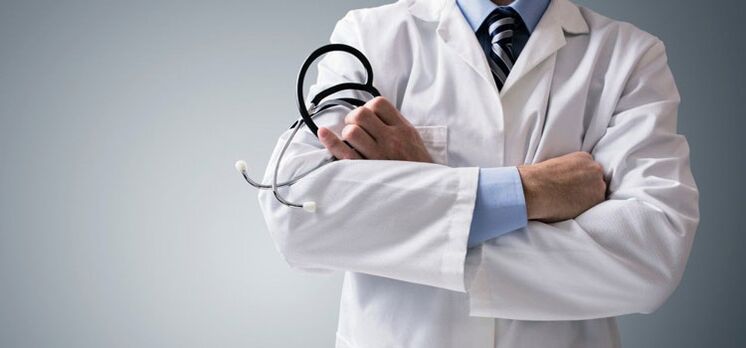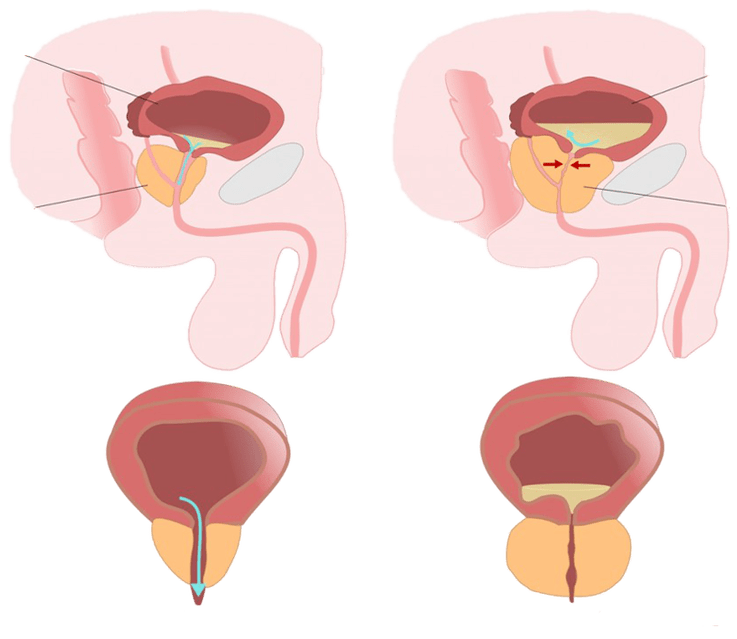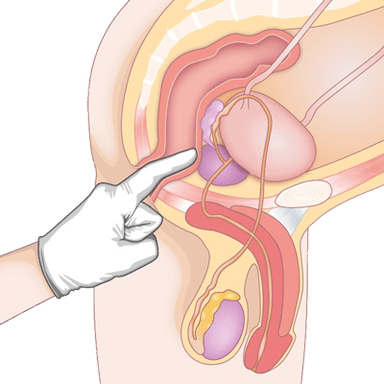
Diseases of the genitourinary system in men are difficult to treat and are recurrent in nature. Prostate pathologies affect hormonal levels, emotional state, erectile and genitourinary function.
Treatment of prostatitis in men is complicated by the fact that in the early stages of development the disorders practically do not manifest themselves symptomatically. The first signs appear when the disease is advanced. Early diagnosis and properly prescribed therapeutic treatment are the key to a favorable prognosis in the fight against the pathology.
What is prostatitis?
With some exceptions, the term "prostatitis" refers to chronic or acute inflammation of the prostate gland. The manifestations of prostatitis in men are similar to the symptoms of other pathologies of the genitourinary system. The process leads to obstruction of glandular tissues and the appearance of the following disorders:
- Dysuric disorders.
- Decreased sexual desire.
- Erectile dysfunction.
- Pain syndrome.
The disease causes the formation of adhesions and scars. Metabolism and blood circulation in tissues gradually deteriorate. Irreversible changes occur that can only be corrected through surgery. There are several types of disorders depending on the etiology and stage of development.
Prostatitis Categories
Inflammation of the prostate matures against a background of congestion in the pelvic area. The process quickly becomes chronic. The favorable time for treatment is the early stage of the disease.
Medical reference books describe 4 types of disease, with characteristic symptoms and manifestations:
- Category I—Acute prostatitis.The catalyst is an infection that has entered the tissue, an injury and hypothermia of the gland. The inflammation occurs suddenly and lasts 3 to 4 days. Without the necessary therapy it becomes chronic. Manifestations:
- heat,
- fever,
- pain in the pelvis and lumbar region,
- intoxication of the body.
- Category II—Chronic bacterial prostatitis.It begins with an exacerbation. Reason for appearance: interruption of antibiotic treatment, self-medication. Inflammation occurs latently, without visible manifestations, until the immune system is weakened so much that the infection triggers an exacerbation of the disease. Treatment begins with antibiotics and NSAIDs.
- Category III—Chronic prostatitis/chronic pelvic pain syndrome (CP/CPPS).A disease mutated by acute inflammation of the prostate gland. The alterations develop slowly, irreversible changes occur that lead to tissue obstruction. Congestive inflammation, in turn, is divided into two subgroups:
- Category IIIa: chronic prostatitis/chronic pelvic pain syndrome with signs of inflammation.It is characterized by pronounced manifestations: low-grade fever, which increases during an exacerbation to 38-38. 5°. Characteristic symptoms of male prostatitis: deterioration of erection, hemospermia, prolonged sexual intercourse without orgasm, impaired urination.
- Category IIIb: chronic prostatitis/chronic pelvic pain syndrome without signs of inflammation.In this case, the manifestations are diagnosed exclusively by instrumental research methods.
- Category IV—Asymptomatic chronic prostatitis (asymptomatic).It is considered a poorly understood disease with a not fully understood etiology. Some prominent urologists have suggested an age-related cause of the disease. There are no symptoms of pathology.

It is difficult to cure prostatitis even at an early stage. To achieve stable remission, it will be necessary to eliminate the causes: catalysts, cope with the complications and consequences that arise.
Why is prostatitis dangerous?
Prostate inflammation is a serious pathology that affects men's health. Possible complications and consequences of the disease:

- erectile dysfunction- Scars and adhesions, a result of inflammation, prevent normal blood flow in the cavernous vessels. At the same time, the prostate's ability to process testosterone is impaired. Sexual desire decreases. In the acute period, friction and ejaculation cause pain. All of the above causes a deterioration of the erection. In some cases, complete sexual impotence is diagnosed.
- Sterility— chronic inflammation affects not only the prostate, but also spreads to adjacent parts and organs of the genitourinary system. Often, degenerative disorders manifest themselves in the ligament: testicles + glandular tissues. The quality and volume of spermatogenesis deteriorates. Getting pregnant by a man with advanced prostatitis is problematic.
- Development of related diseases.- inflammation can spread to neighboring organs of the genitourinary system:
- urethral canal,
- bladder,
- kidneys,
- scrotum
- Death— there is a danger of death in case of purulent disease. If the treatment of acute male prostatitis does not begin in a timely manner and purulent formations appear, turning into an abscess, the patient's life is at risk. A cavity ruptured into the rectum causes general poisoning and can lead to death.
In severe conditions, surgery is required. Unlike adenoma or malignant hyperplasia, surgery is prescribed very rarely and does not guarantee prevention of relapses.
What doctor treats prostatitis?
It all depends on the manifestations of the disease. The urologist remains the main one. It is this specialist who deals with pathologies of the male genitourinary system, including inflammation of the prostate. In case of some violations, it will be necessary to turn to doctors of another specialization.

Current clinical guidelines indicate the need to promote:
- Psychiatrist— help is needed if pain and other manifestations create psychological rejection of sexual relations, impotence without physical disorders.
- immunologist— Prolonged therapy with antibiotics and medications causes a severe blow to the body. Protective functions and the ability to resist infections are reduced. Some forms of prostatitis begin with autoimmune diseases. In each of these situations the help of an immunologist will be necessary.
- Surgeon— a specialist performs opening of purulent abscesses, TUR, prostatectomy and removal of calcifications. The help of a surgeon will be needed to remove adhesions in the seminal ducts and restore reproductive function.
Such a number of specialists necessary for the complete cure of the patient convincingly demonstrates that it is impossible to cure prostatitis alone, much less get rid of complications. Qualified assistance required.
How to recognize prostatitis
The insidiousness of the disease lies in the fact that over a long period the inflammation develops asymptomatically in a latent form. The first signs of prostatitis are often attributed to: fatigue, radiculitis and diseases of the genitourinary system. The pain stops after taking an analgesic or antispasmodic pill. But inflammation of the prostate continues until the disorders become global. A man goes to the doctor, where he is given an unpleasant diagnosis.
Still, the most effective way to get rid of prostatitis is early diagnosis and immediate treatment. The chances of complete cure are approximately 80%.
To differentiate inflammation from other diseases, several diagnostic tests are performed:

- rectal method— the doctor examines the structure of the gland by inserting a finger into the anus, which makes it possible to identify possible anomalies and deviations.
- Ultrasound and TRUS— Ultrasound diagnosis remains the research standard due to its low cost and availability. The monitor shows a loose structure of the gland, which indicates inflammation; It is possible to detect calcifications and other signs of prostatitis.
- Clinical and biochemical tests of blood and urine.- show the presence of inflammation and also identify an infectious agent.
- spermogram- decreased vitality and speed of sperm, characteristic signs of congestive prostatitis and obstruction of glandular tissues. During an infectious disease, bacteria and pathogens are found in the ejaculate.
- MRI and PET-CT- the most reliable diagnostic methods. Due to the high cost, the examination is prescribed only if the results of previously performed tests are unclear, as well as if cancer is suspected.
The CT scan reveals signs of early-stage prostatitis, which is unattainable with other diagnostic methods. If abnormalities in prostate function are suspected, MRI remains the preferred type of instrumental examination.
How long does it take to treat?
Stories of miraculous deliverances in a few days are nothing more than tales. There is no quick way to treat prostatitis. After diagnosing inflammation, it is necessary to tune in to long-term therapy and radical changes in eating habits and lifestyle. Only in this case it will be possible to defeat the disease.
Modern and effective methods of treating prostatitis have made it possible to shorten the period of therapy. With an integrated approach, significant improvements can be achieved in 2 to 3 months.
Doctors have learned to cope with the consequences of prostatitis. Unique therapy methods help eliminate infertility, restore normal erection and increase sexual desire.
After achieving stable remission, you will need to take herbal medications regularly, attend physiotherapy sessions for prevention, and maintain men's health in other ways.
How is prostatitis treated?
There is no effective pill that after taking it all unpleasant symptoms disappear. Among traditional medicine there is no such miraculous remedy either. The best methods for treating prostatitis in men with proven effectiveness include an integrated approach: medication + physiotherapy + unconventional methods.
Official medicine offers conservative treatment. After completing the course, unpleasant symptoms and negative manifestations of the disease disappear. In the second stage, the task is to eliminate the complications that have arisen.
Advanced non-invasive methods have increased the chances of a favorable disease outcome. Surgery is required in no more than 10-15% of cases.
With the help of drugs.
Conservative therapy is carried out aimed at eliminating symptoms. The following groups of drugs are prescribed:

- NSAIDs- relieve inflammation, heat and fever. They have a slight analgesic effect. When prostatitis begins, short-term treatment with anti-inflammatory medications and vitamins is required to keep the gland in normal condition. The medications are available in suppositories, tablets and injections.
- antibiotics- designed to eliminate infectious or bacteriological inflammatory factors. The treatment regimen for prostatitis is prescribed after the pathogen has been identified and tested for resistance to antibiotics. The course of treatment is 7 to 10 days. In severe cases, therapy is extended to two weeks.
- hormones- recommended if the usual treatment with medications has not brought any benefit, as well as in case of decreased sexual desire due to an advanced disease. Treatment with hormones at an early stage is prohibited. The medications are taken under strict supervision of a urologist.
- Symptomatic medications— to eliminate pain, take acetylsalicylic acid pills. Spasms are eliminated with an antispasmodic agent. In case of intense and persistent pain, blockade with an anesthetic is indicated.
- vitaminsand medications to maintain prostate function. During the period of remission, it is recommended to take medications to normalize metabolism and improve blood supply to glandular tissues and juice production. For this, herbal medicines are prescribed. To strengthen the immune system, a complex of vitamins and minerals is indicated.
Self-medication is dangerous and does more harm than good. Before taking any of these medications, it is advisable to consult a urologist.
Using physiotherapy
Prostatitis is characterized by extensive congestion in the pelvic area, which significantly complicates treatment. Taking medications turns out to be ineffective, since the active components simply cannot reach the prostate through the blood vessels.
To increase the effectiveness of drug therapy, immediately after the exacerbation is relieved, physiotherapy is included in the course of treatment of prostatitis in men.
In addition to traditional electrophoresis, the following techniques are prescribed:
- UHF and microwave.
- Magnetotherapy.
- Mud therapy.
- Galvanization.
- Ultraphonophoresis.
- Laser treatment.
- Heat therapy.
Most of the listed procedures are included in the complex of techniques used in spa treatment. Contraindications to physiotherapy persist: acute period of inflammation, development of tumor tumors, individual intolerance of the patient.
Natural medicine
Modern methods of prostatitis treatment increasingly combine official methods with alternative medicine. In ancient times, our ancestors treated prostatitis with herbal infusions, decoctions and bee products. The disease itself did not disappear, but the unpleasant symptoms were relieved.
Some methods have survived to this day:
- apitherapy— Beekeeping products are used to eliminate inflammation and strengthen the immune system. Honey is a natural antibiotic. Used in treatment: death, propolis, wax, pollen, poison. Compresses and massages are made with honey, tinctures.
- Herbal Collections- Urological compounds are sold in pharmacies and you can prepare them yourself. Herbs treat urinary disorders, relieve inflammation and relieve pain. Some plants are good antiseptics. Decoctions and teas are prepared from the collections and added when preparing compotes and tinctures.
In the past there were no hospitals or pharmacies. Ailments were treated using the gifts of "Mother Nature. "After prescribing drug treatment, the urologist will definitely recommend one of the alternative medicine recipes: phytotherapy or apitherapy.

Only an integrated approach in the fight against prostatitis will help to get rid of the disease once and for all. The success of treatment depends on early diagnosis and careful compliance with the urologist's recommendations.























